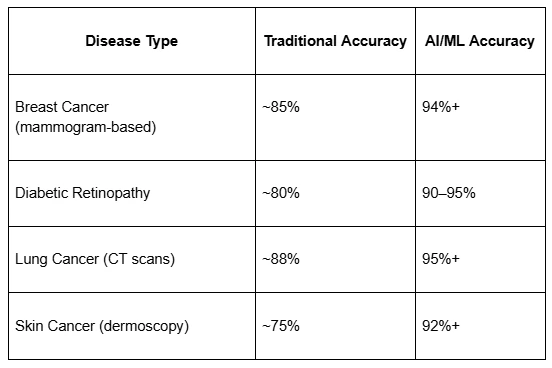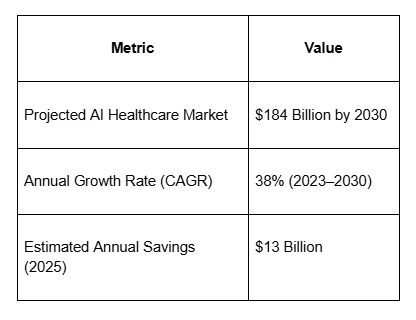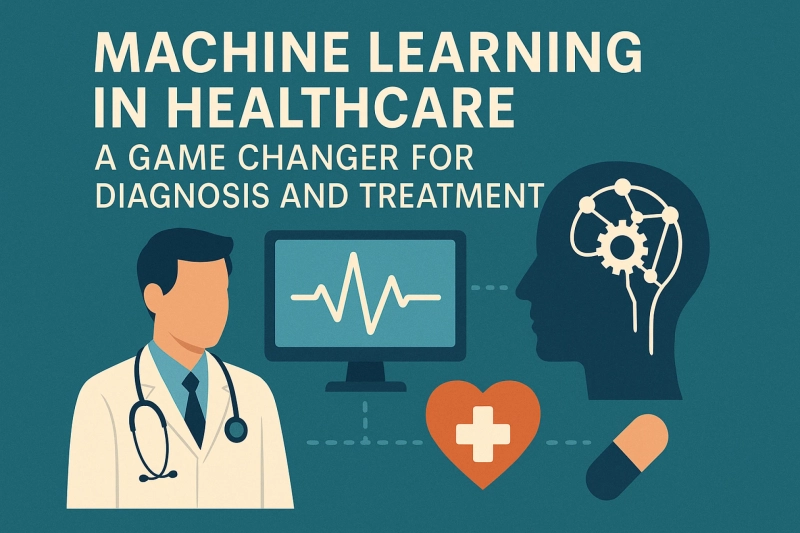In the rapidly evolving digital age, Machine Learning (ML) is reshaping the healthcare industry. As part of the broader field of Artificial Intelligence (AI), ML provides tools that can process vast amounts of data, identify complex patterns, and deliver actionable insights—all at speeds and accuracies that far exceed human capabilities. Today, the intersection of healthcare and ML is creating a paradigm shift, enhancing everything from early disease detection to treatment personalization and operational efficiency.
For healthcare providers and institutions, collaborating with a Machine Learning Development Company is becoming increasingly essential. These partnerships help leverage Machine Learning Services to develop and deploy AI models that meet clinical, operational, and regulatory standards. This blog explores how AI Machine Learning Development is transforming diagnostics and treatments while addressing emerging challenges and real-world applications.
Why Machine Learning Matters in Healthcare
Healthcare data is exploding in volume—from electronic health records and diagnostic images to genomic sequences and wearable device outputs. Traditional methods struggle to analyze this scale and complexity, which is where ML steps in. ML algorithms can learn from this data, detect trends, make predictions, and support clinical decisions with unprecedented accuracy.
ML applications in healthcare include:
- Medical imaging analysis
- Drug discovery and development
- Predictive analytics for patient outcomes
- Clinical decision support systems
- Personalized medicine
Improving Diagnostic Accuracy
Perhaps the most impressive use of ML is in early disease detection and diagnosis. Deep learning models have demonstrated human-comparable or even superior accuracy in interpreting medical images.
Recent statistics:

One noteworthy case is Google Health’s AI model, which identified breast cancer in mammograms with fewer false positives and false negatives than radiologists. Another is PathAI, which improves pathology workflows by assisting with faster, more consistent diagnoses.
These advances not only reduce diagnostic errors but also allow for faster triage and treatment, especially in overburdened healthcare systems.
Personalized Treatment Planning
Every patient is unique. ML empowers clinicians to tailor treatments based on individual health data, including genetics, lifestyle, and comorbidities—a concept known as precision medicine.
For example, companies like IBM Watson Health and Tempus use ML algorithms to match cancer patients with the most effective therapies based on their genetic profile and past clinical data. Similarly, predictive analytics can identify patients at higher risk for hospital readmissions or adverse drug reactions.
Personalized treatment models using AI have shown:
- 30–40% better response rates in targeted therapies
- Reduction in unnecessary treatments
- Improved medication adherence due to individualized strategies
This transformation is enabling doctors to move from reactive care to proactive, predictive, and preventive medicine.
Optimizing Clinical and Administrative Workflows
Beyond clinical diagnostics and treatment, ML is proving indispensable in healthcare administration.
According to a 2024 report by ModernLeader.io:
- AI can automate up to 30% of administrative tasks, such as billing, coding, and appointment scheduling.
- AI-powered virtual assistants and chatbots have improved patient engagement rates by over 50%.
- Predictive analytics help hospitals forecast patient inflows, reducing wait times and optimizing staff allocation.
For example, Northwell Health deployed an ML model to predict patient no-shows, saving over $1 million in missed appointment costs.
The integration of ML across healthcare systems leads to cost savings, enhanced operational efficiency, and better patient satisfaction.
Real-World Examples and Case Studies
1. Early Detection of Sepsis
Researchers at BSRM Consulting developed an ML model that can predict the likelihood of sepsis one week before hospital admission. With a 99% accuracy rate, this tool gives clinicians a critical window for early intervention—significantly reducing mortality and treatment costs.
2. Voice-Based Diabetes Detection
A recent study used voice recordings and health data to predict Type 2 diabetes. The AI model achieved 89% accuracy for women and 86% for men, presenting a non-invasive, scalable solution for diabetes screening in rural or under-resourced areas.
3. AI in Drug Development
Companies like Atomwise and BenevolentAI use ML to analyze chemical compounds and predict their effects. This has reduced the drug discovery process from 10+ years to just a few years, with substantial savings.
Economic Impact and Market Growth
The financial implications of ML adoption in healthcare are massive.

Hospitals, clinics, and pharmaceutical companies are increasingly turning to Machine Learning Development Companies to realize these cost-saving and efficiency gains.
Challenges and Ethical Considerations
Despite its promise, several hurdles remain in ML’s path to widespread adoption in healthcare:
- Data Privacy & Security
- Patient data is highly sensitive. ML models must comply with regulations like HIPAA and GDPR while ensuring cybersecurity.
- Bias and Fairness
- ML models can reflect biases in training data, leading to disparities in care. Diverse datasets and transparent model design are essential.
- Clinical Validation & Trust
- Medical professionals must trust and understand AI systems. Regulatory bodies like the FDA are developing frameworks for approving AI-based medical devices.
- Integration into Existing Systems
- ML models must be interoperable with legacy Electronic Health Record (EHR) systems and adaptable to clinical workflows.
How Machine Learning Development Companies Add Value
Organizations offering AI Machine Learning Development bring domain expertise, technical resources, and regulatory knowledge to the table. By partnering with a Machine Learning Development Company, healthcare providers can:
- Design secure, HIPAA-compliant ML architectures
- Create clinically validated algorithms
- Ensure seamless integration with hospital systems
- Deliver ongoing model training and support
These Machine Learning Services accelerate innovation, reduce deployment time, and ensure measurable ROI.
Conclusion
Machine Learning is no longer a future trend—it’s a present-day necessity in healthcare. From enhancing diagnostic precision to personalizing care and reducing systemic inefficiencies, ML is driving a healthcare revolution.
As the sector evolves, collaboration with expert Machine Learning Development Companies will become essential to stay competitive and deliver superior patient outcomes. Healthcare organizations that embrace AI Machine Learning Development today are poised to lead the charge into a smarter, more efficient, and more humane future.

